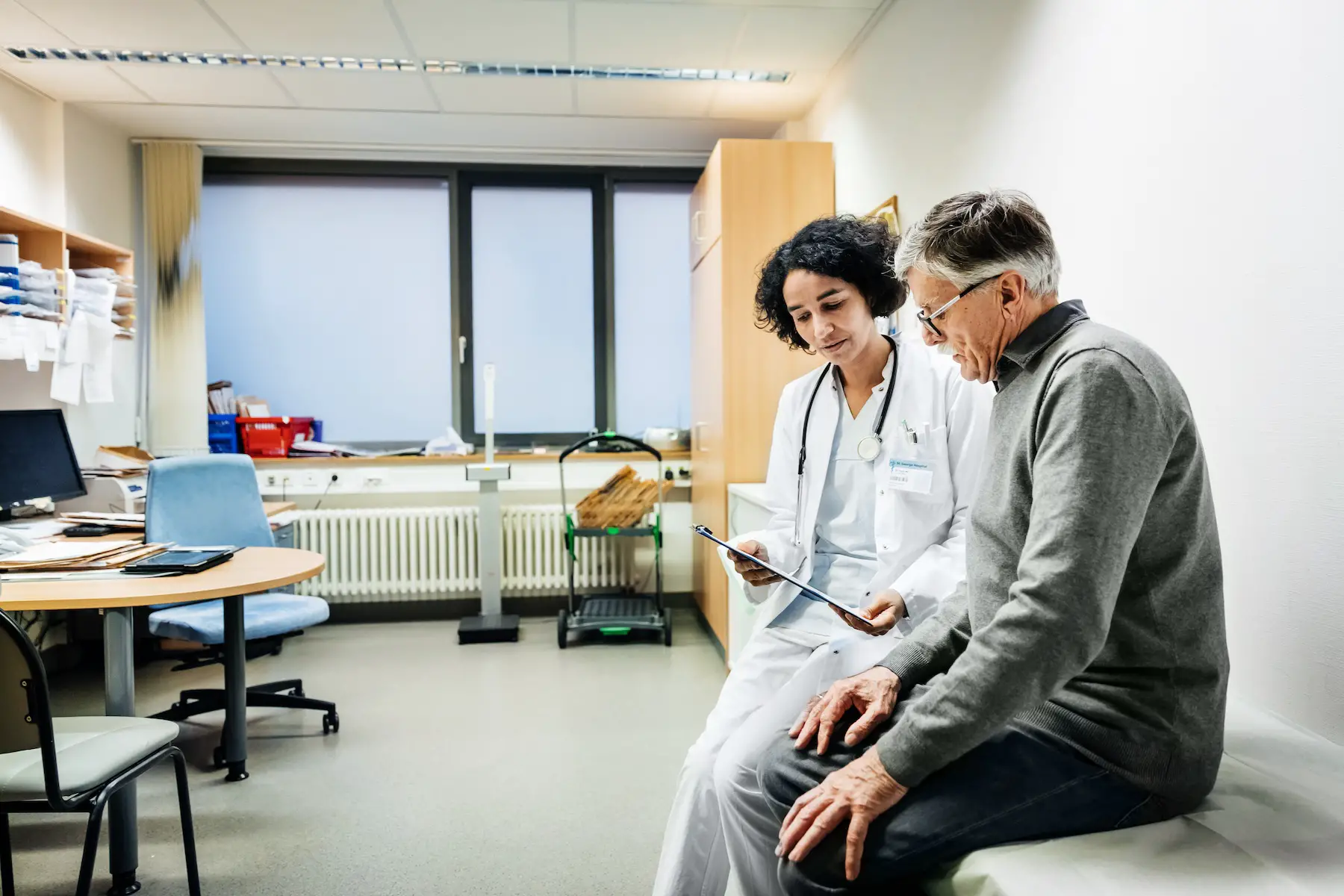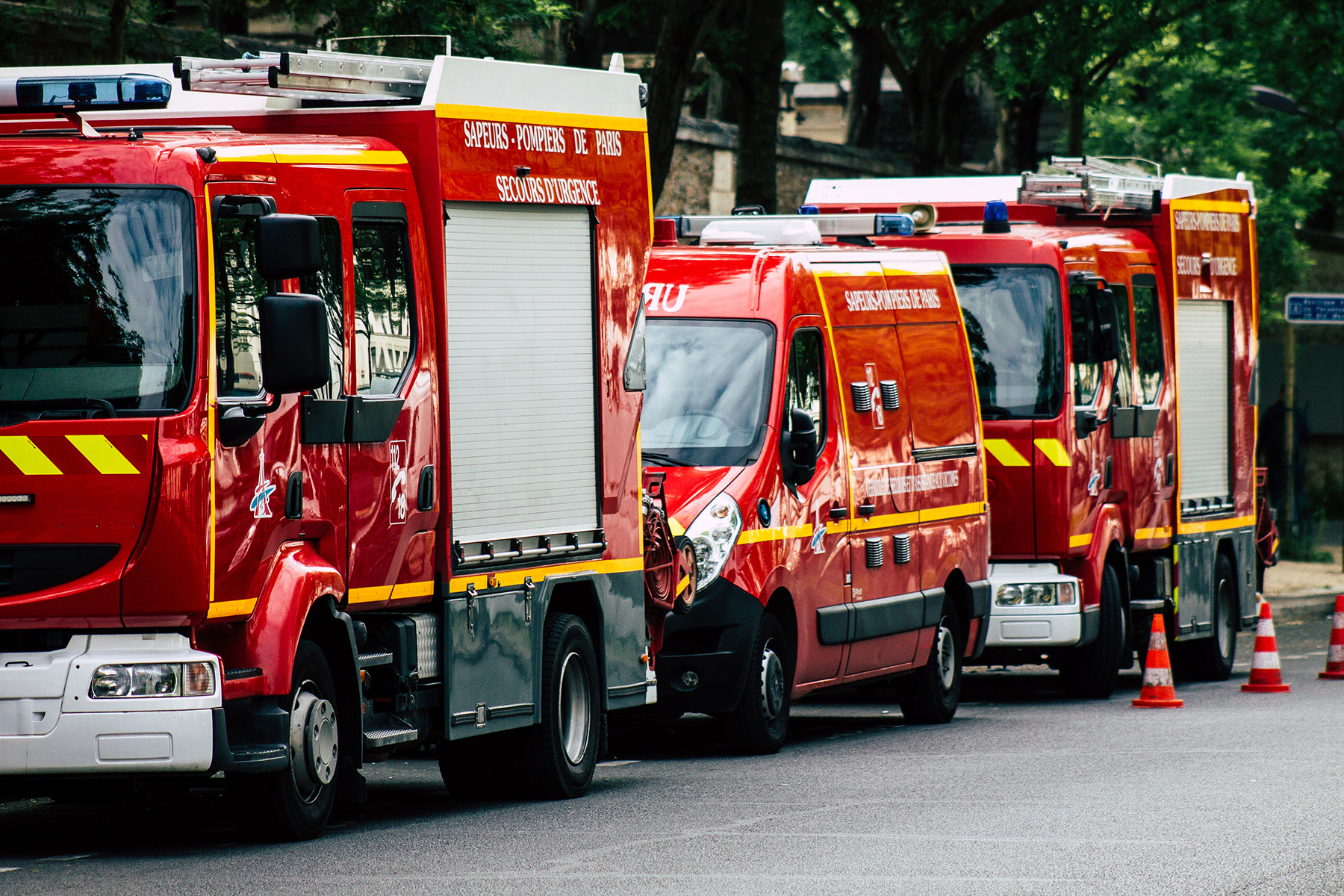Fortunately for expats moving to France, the country not only boasts one of Europe’s most accessible healthcare systems but also world-class medical facilities. Indeed, it is home to some 1,400 hospitals, which can be public, private, non-profit, or for-profit. What’s more, French healthcare services are accessible to both locals and expats alike.
If you are a foreigner living in France, or even just visiting, it’s important to know what you need for a smooth experience at a hospital in France.
Therefore, this article explains the requirements for visiting hospitals in France, including the types of hospitals, costs, and what to do if you need one in an emergency. It covers the following:
Cigna Global
Enjoy peace of mind while living in France with Cigna Global’s long-term international health insurance plans (12+ months). Get tailored coverage, direct billing with many providers, complex case management, and global care on demand, with access to a network of 1.5+ million doctors, specialists, and therapists.
Hospitals in France
Hospitals in France are called hôpital or, more commonly, centre hospitalier. They consist of a fully-integrated network of state-run public hospitals, private hospitals (cliniques privées), doctors, and other medical service providers. Private clinics can be both non-profit and for-profit. Charities or religious organizations usually operate the non-profit cliniques, while for-profit practices can specialize in certain disciplines; however, they can also charge more than the heavily-regulated state-owned facilities.
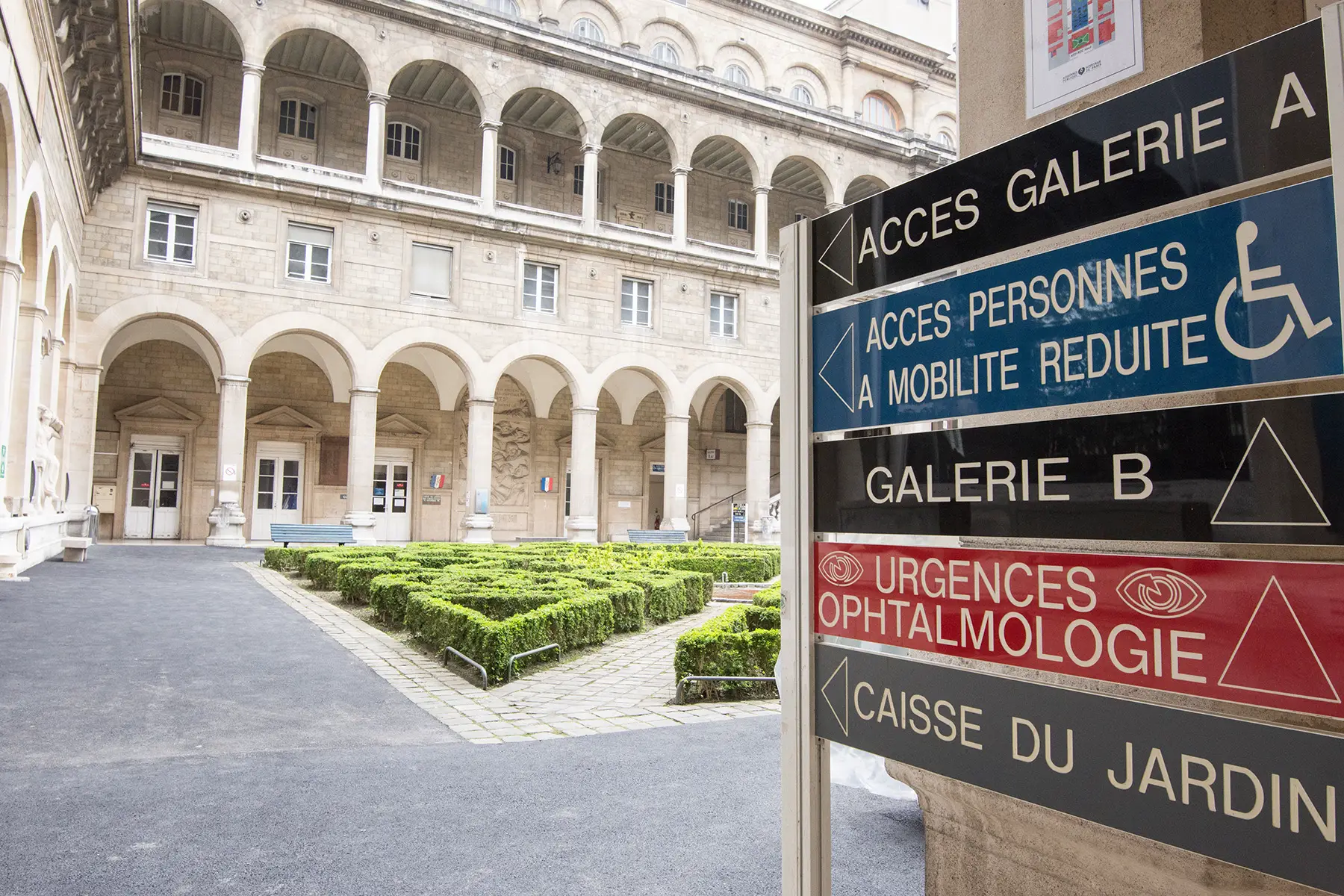
While services offered at cliniques are not always as standardized as hospitals, some private clinics are state-approved and work for the national health service. Therefore, your doctor (médecin traitant) may refer you to either a public hospital or a private provider, depending on the treatments you need. There are also residential facilities for “vulnerable” elderly or disabled people within the French healthcare system.
Patients can choose their primary care physician in France and, unlike most countries, are able to go directly to specialists without a prior referral from a French doctor.
In Paris and the surrounding region, the AP-HP (Assistance Publique des Hôpitaux Parisiens) provides the majority of emergency care, although not all hospitals have emergency facilities. Generally speaking, rather than searching for the best hospitals in Paris or France, you might be better off checking whether the hospital or clinic actually offers the services you need. Across France, hospitals provide care, but also oversee teaching, research, and emergency treatment.
Hospitals with English-speaking staff
While there are several hospitals in Paris with English-speaking staff, this is not always the case for the rest of France. Some medical staff will have at least basic conversational skills, but it might be best to bring a companion fluent in French to act as a translator.
This might also be a good motivator to learn French so that you feel more at ease while visiting hospitals in France. Notably, if you don’t have someone to help translate and want to find a doctor who speaks your language, you can contact your country’s or region’s embassy in Paris. Alternatively, you can use the online health platform ZAVA which connects patients with medical health professionals.
These are the English-speaking hospitals in or near Paris:
How to access hospital treatment in France
Anyone in France can access hospital treatment, and the French social security system is available to all citizens and grants them access to medical care regardless of age, income, or social status. However, state healthcare in France is not free, and both the state and the patient share the costs. In fact, French residents must legally make contributions to the health system through social security deductions from their income. The system is known as co-payment.
This hybrid model is a result of both high taxes and the fact that the country spends more than 11% of its GDP on its mandatory healthcare. The government subsidization means that the healthcare system will typically cover 70% of medical fees and 80% of hospital costs (or 100% in case of a major illness) in France; while the individual — or his/her supplementary private health insurance — covers the remainder.
The new PUMA healthcare system for expats
What about foreigners? Well, as of 2016, a new healthcare system for expats, known as Protection Universelle Maladie (PUMA), also gives internationals access to state healthcare after three months of residency. However, PUMA does come with certain requirements. For instance, besides having to have lived in France for at least three months, you must also be able to show that you are planning on living in the country in a “stable and regular” manner for at least six months of the year. So until you have the insurance scheme, it is best to pay for private insurance.
Fortunately, there are a number of expat-friendly international health insurance firms operating in France, including:
Once you become eligible for France’s state healthcare system, you can apply for a carte Vitale (health insurance card). The card comes with an embedded microchip that certifies entitlement to health insurance and contains all of the administrative information needed by medical professionals. This includes any other private insurance you might have, the name of your doctor, and details of any work-related accidents or illnesses. You can apply for the carte Vitale when you apply for your social security number at your local Caisse Primaire d’Assurance Maladie (CPAM).
La carte Vitale (health insurance card)
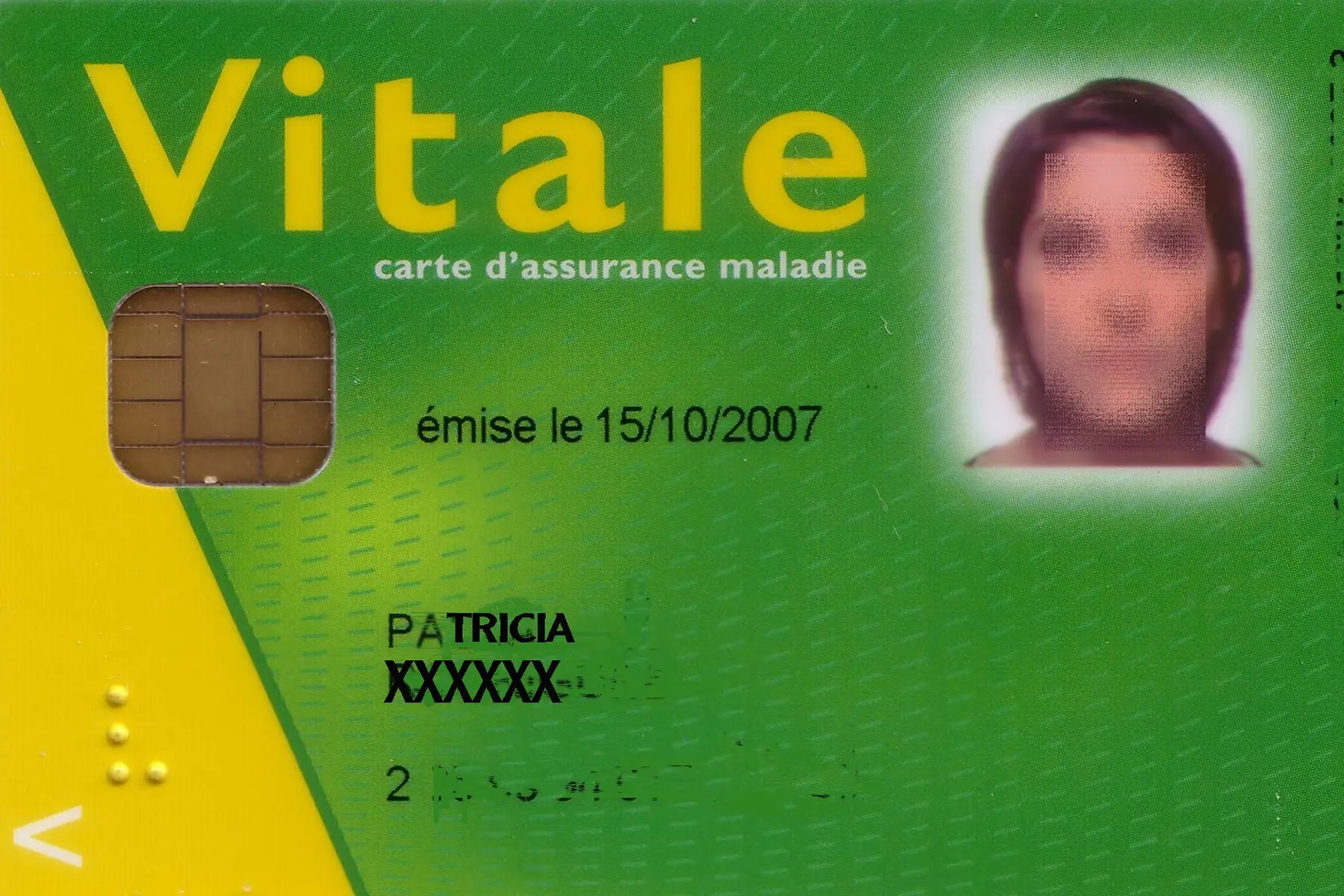
It is important to keep the carte Vitale up to date and make sure that it has all the latest correct details on your address, employer, and doctor. If you need to update your card, you can do so at automatic information points called bornes. These are available at both local pharmacies and health facilities across France.
The European Health Insurance Card (EHIC)
Besides the carte Vitale, foreigners who become residents of France are also eligible for a European Health Insurance Card (EHIC). This entitles them to medical treatment while visiting another EU country, for free, or at a reduced cost.
Whether they live in France or are just visiting, EU citizens who already have an EHIC card from their home country can also use it to access France’s healthcare system at any point during their stay. Non-EU visitors, on the other hand, may need to show proof of medical insurance, which is typically a requirement for getting a French visa.

As previously mentioned, you don’t need a doctor’s referral to access a specific treatment. However, if you don’t consult your physician, you might pay higher healthcare fees, as the reimbursement rate tends to be lowered. That said, this doesn’t apply if you are seeing a pediatrician, gynecologist, ophthalmologist, or are in emergency situations.
Making hospital appointments
There are a few steps to be aware of when making a hospital appointment and visiting a hospital in France. When you want to visit one for a certain treatment, you call the Cabinet Médical to make an appointment. Just bear in mind that getting an appointment on the same day is nearly impossible unless you know how to finesse your way in. But try to be patient, as chances are you will be able to see someone within a few days of calling.
If you are not in urgent need of an appointment, you can check out the website Doctolib where you can book an appointment with just a few clicks, and avoid waiting for a long time. Here, you can filter by specialty and even language(s) spoken.
At the hospital, you will need to show your carte Vitale, EHIC, or some proof of insurance. For public hospitals, you will also need to bring a copy of the notice confirming that you are entitled to state health care.
If you don’t have your carte Vitale with you, you will need to fill out a form called a feuille de soins. This is a document that contains information about the medical costs incurred. Afterward, you will need to send it to your health insurance provider for reimbursement.
Emergency treatment in France
If you need emergency treatment at a hospital in France, you will have to show your carte Vitale or proof of medical insurance and identity document. That said, all French hospitals are legally bound to not refuse patients who can’t pay for emergency services upfront. You also don’t need a doctor’s referral in case of an emergency. If an emergency strikes, you can just go to the emergency room (les urgences).
The French health authority covers most of the costs of emergency treatments in hospitals in Paris and the rest of France. However, you will typically need to pay any outstanding balances upfront. The hospital staff will give you a feuille de soins, which states the treatment you had and, if applicable, an ordonnance (prescription) when you are discharged from a French hospital. It is important to keep both documents as you will need them to claim your reimbursement. Notably, you will be duly reimbursed any fees owed by the government at a later date.
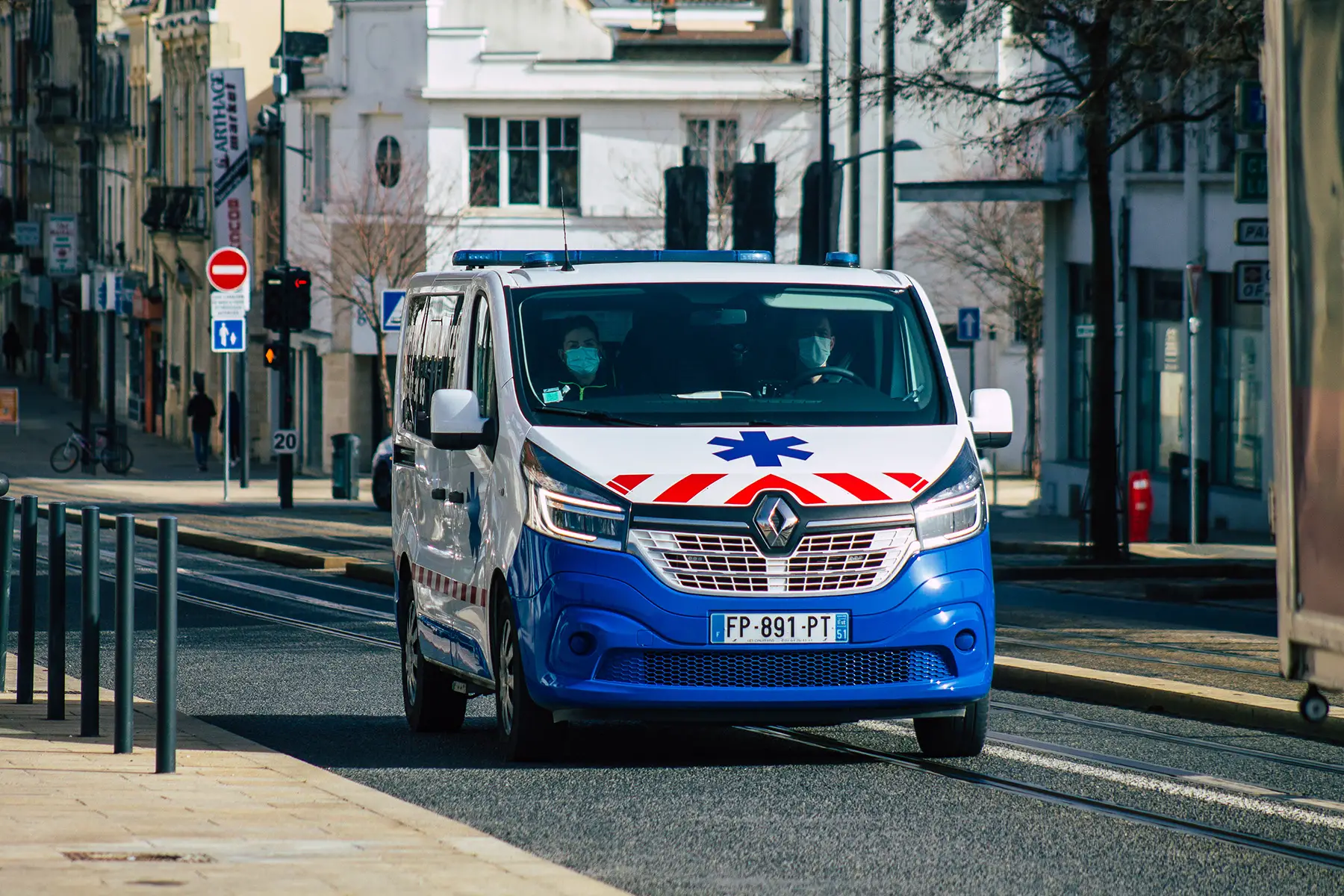
To call for urgent medical assistance within France, you can dial 15, the Service d’Aide Médical d’Urgence (SAMU). The country is home to more than 100 SAMU call centers, which are all linked to local hospitals. Each SAMU center is staffed with trained doctors and medics who will either send a medic your way, organize transport to a hospital, or give medical advice by phone. It is important to be aware that there is no public ambulance service, therefore, transport is arranged through private ambulance services or fire and rescue services. However, you won’t have to pay those costs, as they are covered through social security.
If you are an EU citizen and end up at the emergency room, you might also have to present your EHIC before treatment.
In summary, here are the main emergency numbers to call if you need help:
- All emergencies: call 112 (or 114 for hearing assistance)
- To call an ambulance: dial 15 (SAMU)
- For the police: dial 17
- To contact the fire brigade: dial 18
Hospital stays in France: what to expect
Being in a hospital can be a trying experience, but those in France offer different options to help you feel better about your stay — that is if you have private health insurance.
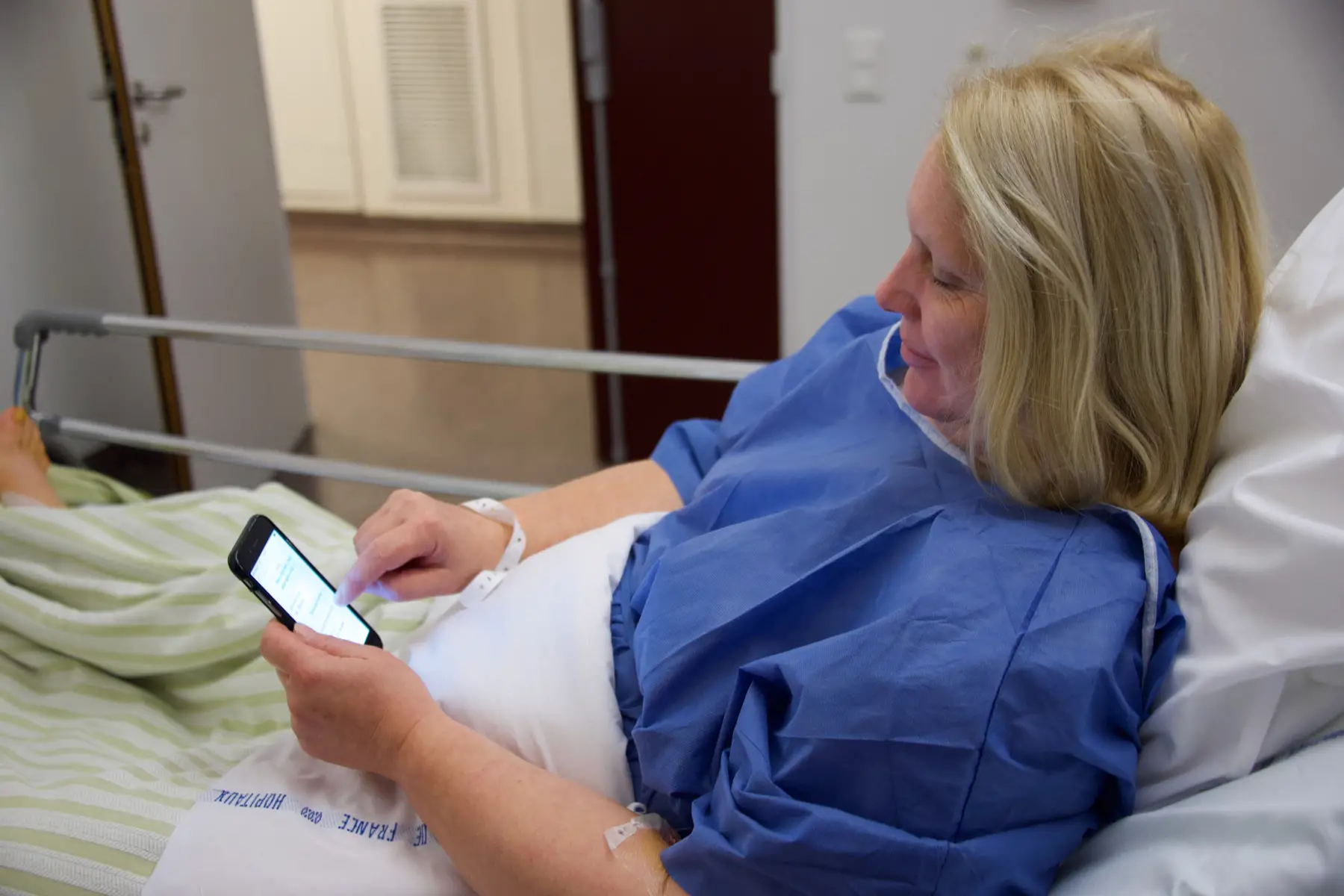
The French health insurance scheme (Couverture Maladie Universelle or CMU-C) reimburses up to 70% of hospital charges but doesn’t cover the costs of board and lodging. However, this is where you can use your French private health insurance or supplementary insurance to cover the full costs. Private insurance also allows you to request a private room, and have a higher level of comfort and privacy during your stay.
Like in most countries, hospital stays aren’t exactly idyllic, but you can expect clean, basic facilities, and shared bathrooms if you are on the social security system.
Hospital costs in France
Health insurance for hospital costs in France
After being admitted to a French hospital, you will need to show proof of your health insurance card (carte Vitale). The hospital might also ask you to show a notice certifying your access to public healthcare (attestation). You should bring proof of private health insurance if applicable, your CMU-Complémentaire (CMU-C) for those with low income, or a European Health Insurance Card (EHIC).
As a rule of thumb, always check the rates of the hospital you are considering as well as the amounts you will be reimbursed, as some facilities charge extra fees that are not covered by the French social security system. Moreover, some clinics are not conventionné, meaning they do not adhere to the national agreement between practitioners and the national healthcare system. You can check the L’Annuaire Santé website to locate a facility and find information on its rates.

Usually, the Caisse will directly cover 80% of your hospital expenses; and 100% in some situations. In this case, if you showed your EHIC or a provisional replacement certificate when you were admitted, you will not have to pay upfront.
Fixed hospital costs
If you are hospitalized, you will only have to pay two fixed sums, although exemptions do apply. The first one is that of the forfait journalier hospitalier, a daily charge of €20 towards the cost of your stay. That includes your bed, meals, and heating, as long as you are admitted for at least 24 hours. If you do pay upfront, you will need to apply for reimbursement by submitting your bulletin de sortie (proof of hospitalization which you will receive upon discharge) to the local health insurance fund (caisse d’assurance maladie) that covers the geographic area in which you were hospitalized.
The second sum is the participation forfaitaire, a charge of €24 which is payable if you receive medical treatment costing more than €120 (as of 2020) at the official rate. The charge is applied for any single medical treatment or for multiple medical acts during the same consultation, where the total charge is more than €120. The charge is applied only once for any single admission.
A voluntary health insurance policy or private policy might be able to cover these costs, depending on the type of policy you have stipulated. For certain types of treatment and certain groups of people, costs for the two forfait charges are reimbursed at the rate of 100%.
Those exonerations by treatment are:
- X rays or scans
- Certain laboratory tests
- Emergency transport to the hospital
- Long-term hospital care (over 31 days)
And the following groups receive exoneration:
- Long-term/major illness (ALD)
- Treatment for sterility
- Pregnant women (last three months)
- Mothers of newly born children (first 30 days)
- Recipients of invalidity benefits/pensions
- Suffering from work-related illness/accident
- Recipients of complémentaire santé solidaire sans participation financière
- Residents of Alsace-Moselle
Emergency costs
If you are dealing with an emergency, the health system will pay the transport costs. In fact, you might be able to claim the cost of your hospital trip even if you aren’t in an emergency situation, as long as your doctor or specialist authorizes the reimbursement. The basic rate of reimbursement for transport (personal vehicle, taxi, public transport) is 65% under the national insurance scheme, with the balance reimbursable from your voluntary insurance policy if you have one.
It is also possible to be hospitalized at home (hospitalisation à domicile), possibly after a period in hospital, or directly through your physician or consultant. In this case, the reimbursement of costs is the same as if you were an in-patient.

If you don’t have public health coverage or want to opt for a higher level of coverage for medical treatment, you can choose private insurance. As previously mentioned, there are a number of global health insurance firms operating in France, including:
Being discharged from a hospital in France
When you are discharged from the hospital, the administrative department will give you a bon de sortie (discharge authorization). If necessary, the hospital doctor or the general practitioner will deliver a new sick leave certificate.
You will be given a feuille de soins, which states what treatment was carried out and, if applicable, an ordonnance (prescription) when you are discharged from a French hospital. It is important to keep both documents and you will need them to claim reimbursement. The government will duly reimburse any fees owed at a later date.
Visiting someone in a hospital in France
Until the COVID-19 pandemic is under control, you can only visit hospitalized patients in France under certain conditions and by appointment. Moreover, in accordance with the new law concerning the management of the COVID-19 crisis in France, only individuals with a valid health pass can access hospitals, with the exception of those with a medical emergency. You must shop your pass when you enter the hospital, via the TousAntiCovid app, or printed legibly on paper.
The best hospitals in France
You can use the following resources to find the best hospitals in Paris or the rest of France:
- Le Point‘s 2021 list of the top 50 public and private sector hospitals across the country
- The Ranking Web of World Hospitals list of the top 100 hospitals in France
Le Point ranked the Centre Hospitalier Universitaire (CHU) in Toulouse as the best hospital in France, followed by the Bordeaux and Lille university hospitals. The top three private-sector clinics remain unchanged from 2020. They are the Polyclinic Reims-Bezannes (the largest private hospital in France), which took the top spot; followed by the Santé Atlantique practice in Saint-Herblain near Nantes; and the Saint-Grégoire private hospital near Rennes.
Useful resources
- The Connexion – a list of the top 10 hospitals in France, according to an influential study
- Newsweek – a list of the world’s best hospitals in 2019 (French category)
- Expatica – provides the latest COVID-19 information, resources, and support


